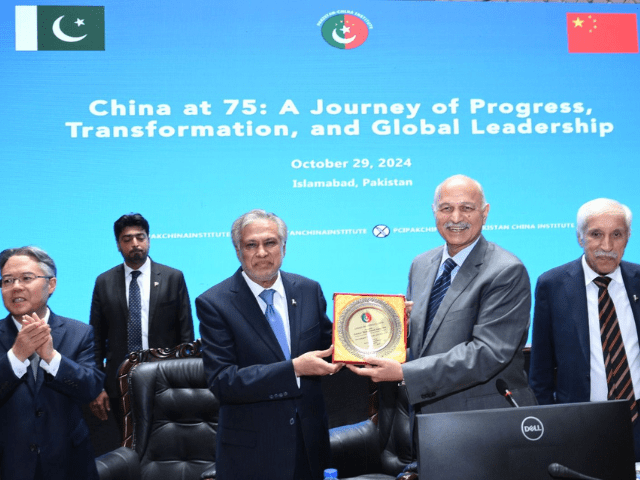Dar also emphasized the significance of the China-Pakistan Economic Corridor (CPEC), countering claims that it represents a debt trap, and reinforcing its role as a driver of socio-economic growth in Pakistan

By our correspondent
ISLAMABAD: The Pakistan-China Institute, under the chairmanship of Senator Mushahid Hussain Sayed, hosted an international conference on Monday titled “China at 75: A Journey of Progress, Transformation, and Global Leadership.” This significant event commemorated the 75th anniversary of the establishment of the People’s Republic of China, examining its substantial influence on global geopolitics and economic development. Deputy Prime Minister Ishaq Dar served as the chief guest, alongside notable figures such as China’s Ambassador to Pakistan, Jiang Zaidong, esteemed economist Dr. Ishrat Hussain, and Qaiser Ahmed Sheikh, Federal Minister for Maritime Affairs.
In his opening remarks, Senator Mushahid Hussain highlighted China’s peaceful rise as a crucial narrative in global affairs. He elaborated on the strategic partnership between Pakistan and China, categorizing China’s journey into three key phases: Revolution, Reform, and Peaceful Rise. Emphasizing Pakistan’s unwavering support for China, he affirmed the nation’s alignment with China as it navigates the complexities of the Asian Century. Ambassador Jiang Zaidong expressed appreciation for the engagement of senior Pakistani leaders and underscored the Belt and Road Initiative (BRI) as a cornerstone of China’s dedication to shared prosperity.
However, he voiced concerns about the security of Chinese projects in Pakistan, particularly following recent attacks on Chinese nationals and investments, calling for enhanced protective measures to safeguard these initiatives. In his keynote address, Deputy Prime Minister Ishaq Dar praised China’s remarkable transformation, particularly in areas such as climate action, digital innovation, and economic growth. He reaffirmed Pakistan’s steadfast support for the One-China policy, underscoring its importance in maintaining regional stability.
Dar also emphasized the significance of the China-Pakistan Economic Corridor (CPEC), countering claims that it represents a debt trap, and reinforcing its role as a driver of socio-economic growth in Pakistan. Dr. Ishrat Hussain provided a comprehensive analysis of China’s shift from a command-driven economy to a market-oriented system, demonstrating how this transition has propelled China to the forefront of the global economy. He noted that China’s single-party governance model has enabled rapid decision-making and policy implementation, facilitating effective responses to challenges and driving impressive economic growth rates.
The conference featured insights from other prominent speakers, including Qaiser Ahmed Sheikh, who reaffirmed the long-standing friendship between Pakistan and China. Mumtaz Zahra Baloch, Director General of the Ministry of Foreign Affairs, highlighted the importance of South-South cooperation in addressing shared challenges and fostering mutual development.



